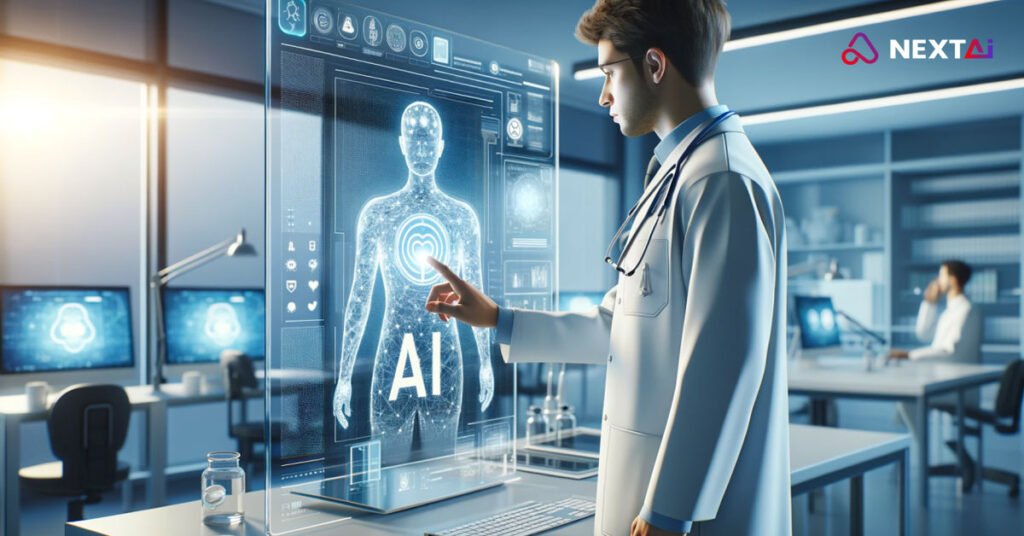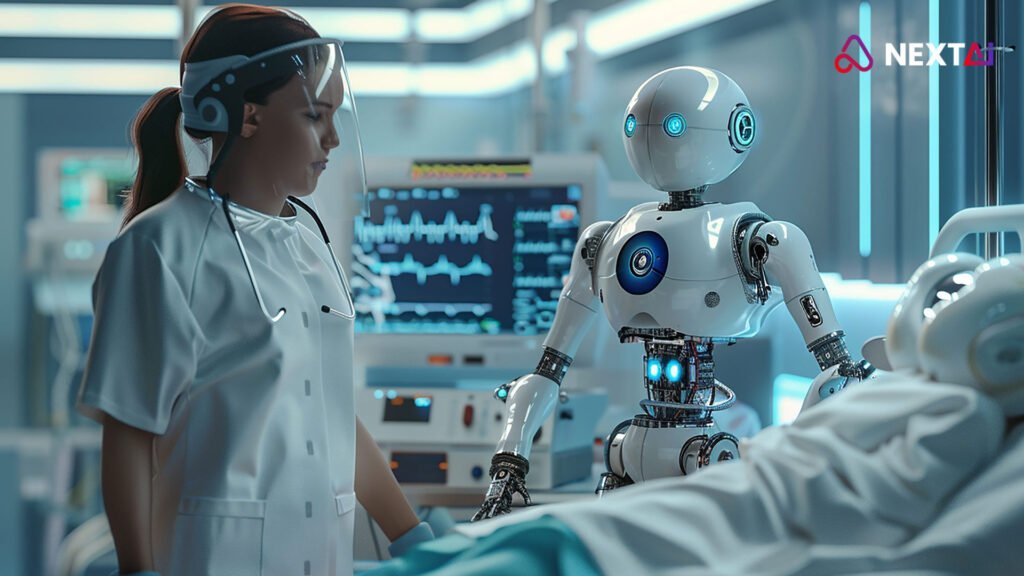
The Future of Healthcare: How AI is Pioneering Precision Medicine and Personalized Care
By Rajiv Rajkumar Bathija | AI in Healthcare
At age 60, with over 15 years of experience in the healthcare sector and a lifetime dedicated to advancing Artificial Intelligence, I am passionate about how AI can revolutionize patient care. As an AI visionary, I’ve seen the profound impact that AI can have on diagnostics, treatment personalization, and predictive healthcare. In this article, I’ll explore how AI is pioneering a new era in healthcare through precision medicine and personalized care, ultimately reshaping how we treat, prevent, and manage diseases.

In healthcare, the potential of Artificial Intelligence is vast, enabling more precise diagnostics, tailored treatment plans, and proactive patient care. By analyzing complex data and identifying individual patient needs, AI is transforming healthcare into a more patient-centered, responsive industry. Here’s how AI is setting the stage for the future of healthcare and opening new possibilities in personalized medicine.
1. Precision Medicine: Tailoring Treatment to Individual Needs
Precision medicine is an innovative approach to healthcare, where treatments are tailored to an individual’s genetic makeup, lifestyle, and unique health profile. AI plays a crucial role in this transformation by analyzing a patient’s genetic data and medical history to design personalized treatment plans.
For example, in cancer treatment, AI can help oncologists determine which therapies are likely to be most effective for a patient’s specific type of tumor based on genetic markers. By moving beyond a one-size-fits-all model, AI-driven precision medicine enhances treatment effectiveness, minimizes side effects, and offers patients a more targeted approach to their healthcare.
2. AI-Powered Genomic Analysis for Disease Prediction
Genomics, the study of genes and their functions, is advancing rapidly with the help of AI. By analyzing genetic data, AI can identify markers associated with specific diseases, predicting a patient’s likelihood of developing conditions like cancer, cardiovascular disease, or diabetes.
AI-powered genomic analysis enables early interventions by helping healthcare providers understand a patient’s genetic predispositions. This insight allows doctors to take preventive measures, such as lifestyle recommendations or tailored screenings, potentially preventing the onset of serious conditions and improving long-term health outcomes.
3. Accelerating Drug Discovery and Development
Developing new medications is a complex and costly process, often taking years to bring a new drug to market. AI accelerates this process by analyzing vast datasets, identifying promising compounds, and predicting how they might interact with biological systems.
For instance, AI can analyze molecular structures and historical drug efficacy data, pinpointing compounds that may be effective in treating diseases. This capability is not only reducing the time needed for drug discovery but also increasing the chances of finding successful treatments. AI-driven drug development has the potential to address pressing medical needs more efficiently, delivering faster solutions to patients.
4. AI in Diagnostic Imaging for Early Detection
Diagnostic imaging—such as X-rays, MRIs, and CT scans—is vital for detecting and diagnosing conditions early. AI enhances this process by helping radiologists analyze images with greater speed and accuracy. Trained on thousands of medical images, AI algorithms can identify patterns that may be missed by the human eye, such as subtle signs of early-stage tumors or lesions.
For example, AI-driven tools are being used to detect breast cancer, lung nodules, and other abnormalities in imaging data, supporting faster diagnoses and earlier interventions. By improving diagnostic accuracy, AI is enabling healthcare providers to offer timely treatments that can significantly improve patient outcomes.
5. Personalized Treatment Recommendations and Dosage Adjustments
AI is not only helping with diagnosis but also assisting in fine-tuning treatment plans. By analyzing data on a patient’s response to medications, AI can recommend dosage adjustments or alternative treatments to enhance efficacy and reduce side effects.
For instance, in chronic disease management, AI can help determine the optimal medication dose for managing conditions like hypertension or diabetes. This individualized approach to treatment minimizes adverse reactions, enhances medication effectiveness, and supports a more customized care experience for patients.
6. Predictive Analytics for Preventive Healthcare
AI-driven predictive analytics is shifting healthcare from a reactive to a proactive model by identifying patients at risk for chronic diseases. By analyzing patient data, including medical history and lifestyle factors, AI can predict who is most likely to develop conditions like heart disease or diabetes and recommend preventive actions.
This proactive approach allows healthcare providers to intervene early, reducing the chances of disease progression and improving patient outcomes. Predictive analytics powered by AI empowers both patients and providers to make informed decisions that promote long-term health.
7. AI in Wearable Health Technology for Real-Time Monitoring
Wearable devices that monitor vital signs, physical activity, and other health metrics are becoming essential tools for managing chronic conditions and supporting preventive care. AI enhances these devices by analyzing the continuous stream of data they collect, alerting patients and providers to potential issues in real time.
For example, wearable technology with AI capabilities can monitor a patient’s heart rate and detect arrhythmias, alerting both the patient and healthcare provider to abnormalities that may require attention. This real-time monitoring supports ongoing health management, particularly for individuals with chronic conditions, and reduces the need for frequent hospital visits.
8. AI-Powered Virtual Assistants for Patient Engagement
Virtual health assistants, powered by AI, are helping to bridge the gap between patients and healthcare providers. These AI-driven assistants can answer questions, provide health advice, and support medication adherence, making healthcare more accessible and improving patient engagement.
For instance, a virtual assistant can remind patients to take their medication, track symptoms, or provide guidance on managing chronic conditions. These assistants offer a convenient way for patients to access healthcare information and support, especially outside of regular office hours, enhancing the overall healthcare experience.

Final Thoughts: Shaping the Future of Healthcare Through AI
AI is setting the stage for a new era in healthcare, where diagnostics, treatment, and preventive care are more accurate, personalized, and proactive. With a deep understanding of healthcare trends and over 15 years of experience in the industry, I am excited to contribute to this transformation as an AI visionary, exploring new ways to enhance patient care and medical research.
From precision medicine to real-time monitoring and AI-assisted drug discovery, the applications of AI in healthcare are vast and transformative. As we move forward, AI will continue to play a crucial role in shaping a healthcare system that is more effective, accessible, and tailored to the individual needs of patients.
If you’re interested in learning how AI can advance healthcare at your organization, let’s connect. Together, we can work toward a future where AI is integral to delivering world-class, personalized patient care and medical innovation.
#ArtificialIntelligence #HealthcareAI #RajivRajkumarBathija #PrecisionMedicine #PersonalizedCare #PredictiveAnalytics #WearableTechnology #VirtualHealth  Author: Rajiv Rajkumar Bathija
Author: Rajiv Rajkumar Bathija
